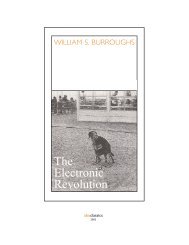Franco ''Bifo'' Berardi - The Soul at Work From Alienation to Autonomy
Franco ''Bifo'' Berardi - The Soul at Work From Alienation to Autonomy
Franco ''Bifo'' Berardi - The Soul at Work From Alienation to Autonomy
You also want an ePaper? Increase the reach of your titles
YUMPU automatically turns print PDFs into web optimized ePapers that Google loves.
externalis<strong>at</strong>ion of the worker in his product means not only<br />
th<strong>at</strong> his labour becomes an object, an external existence, but<br />
th<strong>at</strong> it exists outside him, independently of him and alien <strong>to</strong><br />
him, and begins <strong>to</strong> confront him as an au<strong>to</strong>nomous power;<br />
th<strong>at</strong> the life which he has bes<strong>to</strong>wed on the object confronts<br />
him as hostile and alien.'"<br />
In the social situ<strong>at</strong>ion of the I 960s, with the full development of<br />
industrial societies, m<strong>at</strong>ure capitalism produced goods in growing<br />
quantities, cre<strong>at</strong>ed conditions of wealth for consumers, and kept<br />
rhe promise of a more s<strong>at</strong>isfac<strong>to</strong>ry economic life for all. But the<br />
s<strong>at</strong>isfaction of economic needs was accompanied by a progressive<br />
loss of life, of pleasute, of time for oneself. Millions of people were<br />
experiencing this in their life: the more powerful the economic<br />
machine, the more the life of the worker becomes miserable. This<br />
awareness spread largely in those years and Marx's early works were<br />
able <strong>to</strong> interpret it. <strong>The</strong> concept of alien<strong>at</strong>ion defines this them<strong>at</strong>ic<br />
field and it came <strong>to</strong> Marx from the Hegelian conceptual<br />
context, authorizing a Hegelian reading of the entire discourse.<br />
<strong>The</strong> them<strong>at</strong>ic scenery we can perceive behind the Manuscripts<br />
of 1844 is th<strong>at</strong> of Hegelian idealism. And indeed, the discovery of<br />
this work in rhe 1960s was accompanied by the large diffusion of<br />
the critical thought of the Frankfurt School and of a humanism of<br />
idealist deriv<strong>at</strong>ion.<br />
<strong>The</strong> conceptual scheme of alien<strong>at</strong>ion is idealist in so far as it<br />
presupposes human authenticity, an essence th<strong>at</strong> has been lost,<br />
neg<strong>at</strong>ed, taken away, suspended. <strong>The</strong>refore communism is thought<br />
by the young Marx as the res<strong>to</strong>r<strong>at</strong>ion of an authentically human<br />
essence th<strong>at</strong> was neg<strong>at</strong>ed by the rel<strong>at</strong>ion of capitalist production. In<br />
other terms: the communist revolutionary process is conceived as<br />
the res<strong>to</strong>r<strong>at</strong>l n<br />
obliter<strong>at</strong>lon-<br />
'0 of an original identity whose perversion, temporary<br />
,<br />
, whose «alien<strong>at</strong>ion ) ) in other wordS-IS represented<br />
by the workers' present condition.<br />
"Communism therefore as the complete return of man <strong>to</strong><br />
himself as a social (i.e., human) being-a return accomplished<br />
consciously and embracing the entire wealth of previous<br />
development. This communism, as fully developed n<strong>at</strong>uralism,<br />
equals humanism, and as fully developed humanism<br />
equals n<strong>at</strong>uralism; it is the genuine resolution of the conflict<br />
between man' and n<strong>at</strong>ure and between man and man-the<br />
true resolution of the strife between existence and essence,<br />
between objectific<strong>at</strong>ion and self-confirm<strong>at</strong>ion, between freedom<br />
and necessity, between the individual and the species.<br />
Communism is the riddle of his<strong>to</strong>ry solved, and it knows<br />
itsdf <strong>to</strong> be this solution,"6<br />
<strong>The</strong> ideological vice of the young Marx's formul<strong>at</strong>ion resides entirely<br />
in this presupposition of a generic human essence whose neg<strong>at</strong>ion<br />
would be represented by the concrete his<strong>to</strong>ry of the conditions of<br />
the working classes. But where does this presupposition find its<br />
basis, if not in rhe idealisric hypostasis of human essence? Here<br />
Marx's language reveals its conceptual continuity with Hegel's, and<br />
its persistence within the idealistic problem<strong>at</strong>ic.<br />
In order <strong>to</strong> better understand the idealistic function of the<br />
concept of alien<strong>at</strong>ion, and the connected idealistic machinery<br />
revolving around the notion of a generic human essence-and of<br />
his<strong>to</strong>ric subjectivity-we need <strong>to</strong> refer <strong>to</strong> Hegel's work, <strong>to</strong> the very<br />
dynamic of the Hegelian language:<br />
.<br />
38 / <strong>The</strong> <strong>Soul</strong> <strong>at</strong> <strong>Work</strong><br />
L<strong>at</strong>)or and Alien<strong>at</strong>ion in the pt)ilosophy of the 19608 /39




